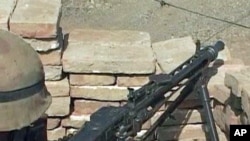After five weeks of fierce fighting, the Pakistan military says it has made significant progress in an ongoing air and ground offensive against the Taliban and other insurgents in South Waziristan, along the border with Afghanistan. Analysts say top militant leaders appear to have melted away, but at the same time have unleashed a wave of suicide bombers to attack government and civilian targets in Pakistan.
Pakistani military commanders say they have captured most major Taliban bases and towns in their offensive, called Operation Path to Deliverance in South Waziristan.
Army soldiers have advanced more quickly than expected, killing hundreds of militants and capturing the high ground that encircles towns in this remote and sparsely populated region.
Pakistani Army Brigadier Farrukh Jamal:
"They had occupied all these surrounding high peaks," said Brigadier Jamal. "From these peaks they gave us a very tough resistance. There was very fierce fighting here. But thank God we managed to capture all these peaks, and we killed them here."
Jamal says his men have cut the Taliban's supply lines and are now going after those hiding in forests and caves in this mountainous area.
The soldiers displayed a large number of captured weapons, ammunition and vests used by suicide bombers.
They also found militant propaganda, training materials, bomb making instructions, Pakistani passports, as well as DVD's and tapes with messages from al-Qaida terrorist leader Osama bin Laden.
Analysts say the military learned from previous campaigns against the militants in a region where it has lost hundreds of soldiers in previous fighting.
The Pakistani air force spent weeks bombing the area before an estimated 30,000 ground troops entered South Waziristan from three directions.
Military officials estimate there were up to 10,000 Taliban militants operating in South Waziristan, so only a small number have been killed.
Reza Jan follows the fight against the Taliban for the Critical Threats Project at the American Enterprise Institute.
"What was clear to them was that they were not being able to defeat the military on the terms that the battle was laid out," said Reza Jan. "The resistance really seemed to have melted away and they more or less either fled into the mountains or fled into neighboring agencies."
The Pakistani Taliban is led by the Mehsud tribe, which has launched a relentless series of suicide bombings against civilian and military targets in heavily populated areas of Pakistan.
The bombings have caused support for the Taliban in Pakistan to plummet, according to Fred Kagan who directs the Critical Threats Project at the American Enterprise Institute.
"We have gone, at least for the moment, from a situation in which there was relatively greater support among the Pakistani public for groups like the Taliban and Islamists in general to a situation where those groups have enjoyed much less support and falling support, which is in many respects even more important," said Fred Kagan.
U.S. officials have praised the Pakistani operation in South Waziristan, but want the country to expand its fight to go after militants in North Waziristan who carry out attacks against American and NATO troops in Afghanistan.
They also want Pakistan to move against the Afghan Taliban leadership in the southern Pakistani city of Quetta.
The Haqqani Network in North Waziristan and the Afghan Taliban are reported to have had close ties with Pakistani intelligence officials and Kagan says he expects they will not be attacked.
"I think it is extremely unlikely that the Pakistani military is going to take on the clearing of North Waziristan in any short period of time or perhaps ever," he said.
South Waziristan has long been considered a safe haven for al-Qaida leaders who fled into Pakistan's tribal areas following the U.S. invasion of Afghanistan in 2001. Analysts say it is a possible hiding place for Osama bin Laden.
News
Pakistan Military says Significant Progress Made in Fight with Taliban
update
